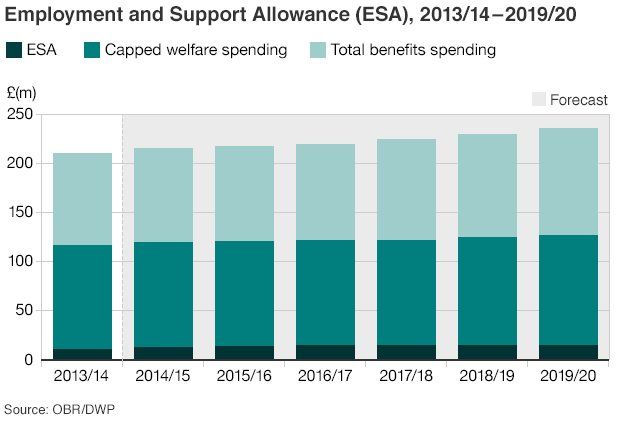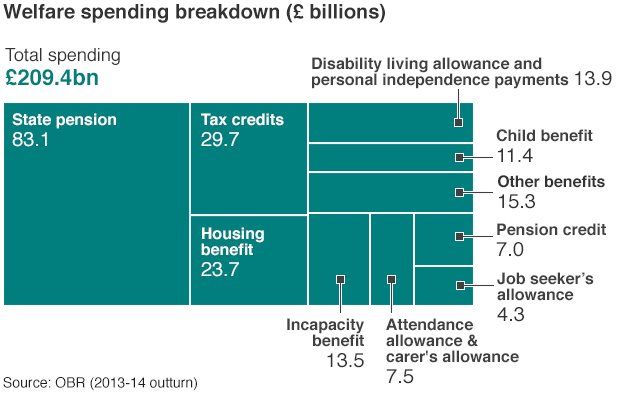Sickness benefit shake-up considered
Plans to scrap part of the UK's main sickness benefit are being considered, a leaked Whitehall paper suggests.
It describes the Employment and Support Allowance as a "passive" benefit which does not "incentivise" people to find a job, and proposes abolishing the work-related activity group (WRAG) category.
If scrapped, weekly payments would drop nearly £30 from £102.15, bringing it in line with Jobseeker's Allowance.
The Department for Work and Pensions said it did not comment on leaks.
Disability charities described the leaked information as "deeply concerning".
The government is seeking to save £12bn from its welfare bill.
It is expected next week's Budget will unveil only some of its proposed cuts, with others to be announced in the autumn spending review.
![]()

How much is Employment and Support Allowance?
Work-related activity group: Up to £102.15 a week
Support group: Up to £109.30 a week
And Jobseeker's Allowance?
Aged 18 to 24: Up to £57.90 a week
Aged 25 or over: Up to £73.10 a week
![]()
The paper seen by BBC News was written by the Department for Work and Pensions before the general election in May.
It is marked "not government policy", but the BBC understands the proposals are still under consideration.
About two million people in the UK receive the Employment and Support Allowance, in some form.
It is paid out to disabled or sick people who are unable to work or need help getting back to work.
Among them is Laura Berridge, who has suffered from arthritis for three years and says she needs the extra money because of the costs of her illness.
"All of these small adaptations, the reliance on my car which is huge, the amount of petrol that I get through because I have to use my car - it's not something that I want to [do], I used to love walking, but I have to have my car now," she said.
"So, for me, it is entirely justified and to be quite honest, we couldn't cope without it."

Currently, people undergo a fit-for-work test to decide how their illness or disability affects their ability to work.
If eligible for the benefit, they are placed in either the WRAG category, and must prepare for employment, or a support group category and are not expected to work.
Those who do not meet the criteria may be given Jobseeker's Allowance of up to £73.10 a week instead.
![]()
The welfare budget in brief

- In 2015-6, spending on benefits, pensions and tax credits is expected to total £220bn
- State pensions and age-related benefits, such as winter fuel allowance and free TV licences, will account for £95bn
- Child tax credits and working tax credits - £30bn
- Housing benefit - £26bn
- Disability and incapacity benefits - £37bn
- Child benefit - £12bn
- Pension credit - £6bn
- Jobseekers Allowance and income support - £5bn
Source: Institute for Fiscal Studies
Read more about where the welfare budget is spent
![]()
'Millions saved'
The paper also proposes renaming the assessment tests "employment capability assessments", rather than work capability assessments, in order to focus attention on job-seeking, not benefit-seeking.
It says removing the £30 top-up for WRAG claimants would give people less reason to worry that they were getting the "wrong" outcome from their assessment.
The tests would identify claimants' strengths, rather than focus on what they could not do, and would be carried out much sooner in the application process, the paper says.
Under the plans, the government could save hundreds of millions of pounds by the end of the decade, the paper says.
Charlie Pickles from Reform, a think tank focusing on public service delivery that was co-founded by Conservative MP Nick Herbert, said the current system encourages people to stay on the benefit rather than finding work.
"We have a huge gap between disabled people's employment rate and non-disabled people's employment rate and if you are building in perverse incentives, within a benefit system, then you are encouraging people to move on to that benefit," he said.
Ministers are also understood to be considering changes to the support group category of the Employment and Support Allowance, with a possible announcement in the 8 July Budget.
A spokesman for the Department of Work and Pensions said: "This is speculation based on documents leaked before the election. We do not comment on leaked documents."

Rob Holland, from Mencap, the charity for people with learning disabilities, said the leaked information was "deeply concerning".
"Disabled people, their families and carers tell us they are extremely anxious about the government's proposal to cut £12bn from the welfare budget. They are worried where these cuts will fall and how deep they will be," he said.
"Abolishing this benefit would contradict the government's aim to halve the disability employment gap as set out in the Conservative manifesto. In addition cutting benefits to the bare minimum will prevent people seeking work effectively."
Paul Farmer, chief executive of mental health charity Mind, said: "It is insulting to suggest that people supported by ESA because they are living with illness or disability would be more likely to return to work if their benefits were cut.
"We know that most people with mental health problems want to work but face significant barriers as a result of the impact of their condition and the stigma and discrimination they often face from employers."
